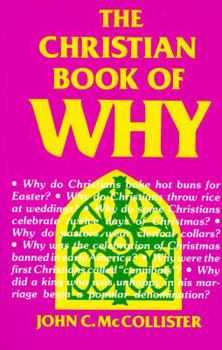The Christian Book of Why
McCollister examines such topics as snake-handling in churches, why women were once forbidden to sing in church choirs, wedding traditions, and other aspects of different religious denominations. He... This description may be from another edition of this product.
Format:Paperback
Language:English
ISBN:0824603176
ISBN13:9780824603175
Release Date:January 1983
Publisher:Jonathan David Publishers
Length:348 Pages
Weight:0.05 lbs.
Dimensions:1.1" x 5.5" x 8.5"
Customer Reviews
3 ratings
Good Background To Practices And Beliefs
Published by Thriftbooks.com User , 17 years ago
Not only show's the unique differences, but the many similarities of a wide range of Christian denominations. The history of traditions and Biblical passages for various doctrines.
Good Overview
Published by Thriftbooks.com User , 21 years ago
Like the Jewish Book of Why, The Christian Book of Why gives a fine overview of key elements of Christianity. Issues such as Jesus, holidays, life events, and customs are discussed in easy to read detail.I would have liked to have read more questions and answers related to the differences between different denominations. An example would be the differences between the practices of Catholics and Protestants. As a non-Christian my understanding of this is not so strong.Nonetheless, the Christian Book of Why is a very good resource for those who desire a general overview of the Christian religion.
All About Christianity
Published by Thriftbooks.com User , 23 years ago
The late Bishop James A. Pike used to say that most Americans are "theologically illiterate." He meant that they hadn't had any formal religious education since they had finished Sunday School or catechism classes (and perhaps were confirmed). They still had the understanding of their faith gained as adolescents. There is a book, however, which might easily improve this situation. "The Christian Book of Why" (Testament Books, 1983) provides clear information in a format appropriate for both browsing and reference. John C. McCollister is a Lutheran pastor who answers about 500 questions on Christian belief and ritual. Author of a dozen other books and hundreds of articles in publications such as "The Boston Globe" and "The Saturday Evening Post," McCollister has a Ph.D. from Michigan State University and travels widely presenting seminars on the topic of making money by writing. In the words of the book's introduction: "The Christian Book of Why" does not attempt to advise Christians on how to conduct their lives. It does not take sides in issues on which Christians have differed over the centuries. Instead, it merely explains why certain Christians choose to believe or behave as they do. The material is divided into ten sections: Jesus; Practices & Beliefs That Unite & Divide; Water, Bread, and Wine; Public Worship; Prayer & Private Worship; Marriage & Divorce; Festivals & Seasons; Holy Objects & Symbols; Pastors, Priests, Popes; Saints & Sinners. The book's greatest virtues as a reference are its even-handedness and very thorough index. The author strives to give both sides of any controversial issues. For example, McCollister handles the sacrament of baptism this way: Why do some Christians baptize infants? The Book of Acts reports baptisms of entire families of people at one time. The earliest explicit mention of infant baptism doesn't appear until the second century. St. Augustine was one of the earliest church fathers to defend this practice around the start of the fifth century. Today most Christian churches practice infant baptism, believing the benefits rest in the working of the Holy Spirit who is able to enter the heart and soul of a child as much as an adult. Why do some Christians baptize only adults? Some churches reject the baptism of infants not old enough to speak for themselves. They believe a candidate should have reached an age of accountability and demonstrated some evidence of a personal conversion experience. This insistence on "believer baptism" requires adult converts to these denominations to be rebaptized since they can now speak for themselves. Other questions which are answered include: *Why was the celebration of Christmas banned in Colonial America? *Why do some clergy wear clerical collars? *Why are Christians divided on the issue of alcoholic beverages? Why are songs sung at Christmas called "carols"? Why does Easter occur at different dates each year? Why is incense






